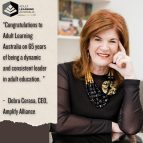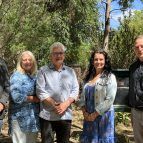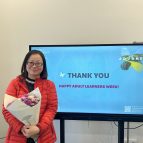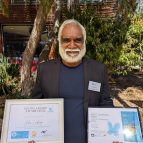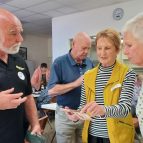Getting adult students out of survival mode and into learning
 Amanda Wilson became a volunteer adult literacy tutor in 2011 when Libraries Tasmania put out a call for tutors in northern Tasmania.
Amanda Wilson became a volunteer adult literacy tutor in 2011 when Libraries Tasmania put out a call for tutors in northern Tasmania.
Volunteering in her local library, Amanda came to see how helping adults improve their reading and writing skills can change lives, particularly when they can then access new opportunities for better employment, health, and community connections.
Amanda completed training in tutoring adult learners and has always been an active participant in her regional professional development program for literacy tutors. She is also a member of Adult Learning Australia (ALA), the Australian Council of Adult Literacy (ACAL) and Neurodiversity and LLN Communities of Practice.
In 2022, Amanda was curious to find out more about how to reduce feelings of educational fear. Amanda visiting the Dublin Adult Learning Centre, had seen the negative impacts of educational fear on her learners, including them feeling embarrassed, anxious, and stigmatised.
“Educational fear is often the result of poor previous educational experiences, and it then has such a negative impact on how the person is able to learn.”
“Unless learners can feel calmness and less anxious, learning is much harder and more frustrating. And the learner is then more likely to stop attending.”
Amanda said she wanted to be able to understand more about educational fear and how to reduce its impacts. Particularly as it seemed clear that it can affect all learners regardless of their age, gender, or situation.
“Looking back now, I can see in the way many of my learners behaved when they called in sick or were flustered when trying a new activity that educational fear was probably the reason.”
Amanda applied for a Churchill Trust fellowship which would allow her to explore evidence-based practices overseas and develop a practical guide for tutors to use in Australia.
ALA CEO, Jenny Macaffer, met with Amanda during the scoping phase of her research, suggesting key contacts overseas and valuable resources to explore.
Jenny believes it is important to provide easy access to ‘go to’ resources to strengthen the capacity of educators and volunteers working in this space. Jenny said that overcoming fear of learning can transform learning from an intimidating experience into a rewarding journey, as learning can unlock potential, inspire a sense of achievement and boost confidence.
After conducting 90 interviews across 25 adult and community education providers in New Zealand, Canada, New York, Ireland and Scotland, Amanda’s guide is now available.
“It is very much a practical guide, not an academic paper. It is based on what I observed and was told has worked overseas and includes recommendations and actions, practical examples, things a tutor might implement if meeting with a learner tomorrow.”
Amanda says that the guide – which is intended for adult literacy and numeracy service providers, tutors, industry bodies and education policy makers – includes education methods that have helped learners reduce feelings of educational fear and explores “why it is important to address these feelings, what we can do, how we can do it, and how to tell if it’s working”.
The focus is on adult literacy practices where English is the first language. And knowing that adult learners study in a wide variety of settings, Amanda wanted to make sure she addressed how educational fear can be reduced across all settings.
Some of Amanda’s key findings include the benefits of tutors being able to:
View and approach learners holistically, considering their whole life context and supporting them to be ready to learn
Reposition their role as a partner in learning rather than a traditional ‘teacher’ recognising that learners have valuable life experience and skills, and tutors can also model positive learning behaviours
Recognise growth and learning can be uncomfortable and have conversations with learners to reframe these feelings as natural, safe, and usually a necessary response to trying something new.
Amanda said she found that there is greater recognition overseas of tutors as “accidental counsellors” and, as such, they are supported in developing skills, such as who may require broader support.
“The reality is that adult learners are always going to be thinking about other things and to be impacted by everything that is going on in their lives.Tutors don’t need to be able to meet all needs, but it helps to be part of referral networks so that when a learner shows their trust by telling them something they are able to support the learner to get access to services.”
You can read more about how insights provided by adult learners led Amanda to see the potential for a broader scope in the Commentaries section of our website.
If you are an ALA member, you can also access the February ALA webinar which discussed Amanda’s research.
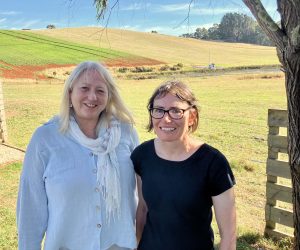
ALA CEO, Jenny Macaffer, and Amanda Wilson in Tasmania.

